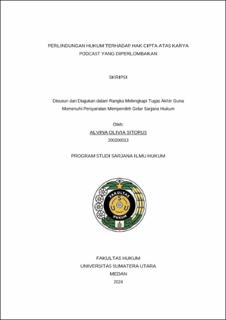| dc.description.abstract | Podcasts are one of the rapidly growing digital products and have become a popular choice for people to acquire knowledge and information. However, this growth also brings about various copyright issues, particularly concerning podcasts used in competitions. Podcast content uploaded on platforms like YouTube is vulnerable to copyright infringements such as duplication, piracy, plagiarism, and unauthorized re-uploading by parties other than the original creators. This study explores these challenges and emphasizes the importance of copyright protection in safeguarding podcast works in the digital era.
This research was conducted using a normative legal research method by analyzing UUHC and other supporting reference materials and distributing questionnaires to obtain supporting data in completing this research. The data used in this study were collected from 32 respondents obtained through the distribution of Google forms to participants and also the organizing committee of the podcast work competition. This study uses a statute approach and a Conceptual Approach. This research is descriptive. The data sources used in this study are secondary data. Data collection was carried out using document studies or library research. The data analysis used is qualitative analysis. The conclusion drawing used in this thesis research is using the deductive conclusion drawing method.
This study concludes that Law Number 28 of 2014 on Copyright, which serves as the positive law in Indonesia, does not explicitly regulate podcasts. However, podcast interpretation has so far been based on the provisions of Article 40 of the Copyright Law regarding cinematographic works. Additionally, the terms set forth in podcast competitions organized by Kawula Muda Event Organizer and POTATION (Podcast Competition) include agreements between the organizers and participants. Nonetheless, these terms are considered unclear regarding the distribution of economic rights. Furthermore, if copyright infringements occur on podcast works used in competitions, under the Copyright Law, disputes can be resolved through alternative dispute resolution (ADR) mechanisms, arbitration, or the Commercial Court. | en_US |


